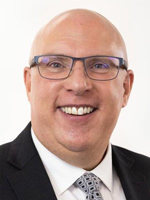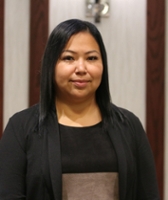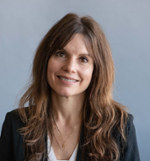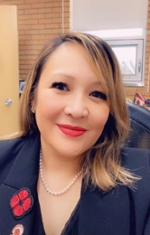Tuesday, July 2
Description:
Our sessions will lead participants through a "day in the life" conversation of two perspectives of leadership: urban and rural. The overarching topics for discussion will be related to the following:
- School Culture
- Instructional Leadership
- Student Support
- Parent and Community Engagement
- School Safety and Security
- Leading School-based Professional Development
- Communication and Leadership
| Bio: Arlene is currently the principal of Loreburn Central School, a small K-12 school located in Sun West School Division. Her role as an educator has allowed her a variety of career opportunities that range from high school classroom teacher, learning coach and consultant, Vice Principal of the Distance Learning Centre (currently known as SaskDLC). She has a passion for innovative practices that relate to Instructional Leadership. In her spare time, she loves directing plays, camping and live music! | 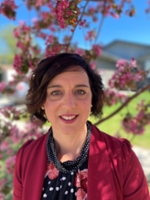 |
|
Bio: Tricia Erlendson has been an administrator in the Regina Catholic School Division, since 2011. Community Education holds a special place in her heart and collaborating with teachers to support students fills her bucket. Tricia is the principal at Deshaye School in Regina, the 10th school in her teaching career. |
 |
Wednesday, July 3
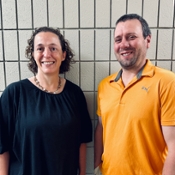
Description: The agriculture and bioresource sector goes far beyond the outdated farming stereotype of the farmer in overalls with a pitchfork. Agriculture and agri-food are big business in Saskatchewan and around the world, with incredible opportunities for cutting-edge science, innovation and entrepreneurship in ag technology, genetics, computer science, engineering, food science and more. This comes with the opportunity to have meaningful impact on local and global economic development, local and global food and water security and nature-based climate solutions. Unfortunately, many still subscribe to those outdated farming stereotypes, and our youth may not recognize the tremendous opportunities they have for careers in this sector, including right here in Saskatchewan and indeed, right in their home communities: whether urban, rural or on First Nations reserves. In this session, we will outline some of these opportunities and explore how the education sector can help shift the outdated narrative, growing opportunities for communities across the province and beyond.
Bios:
Angela Bedard-Haughn (PhD, PAg) was born and raised on a mixed farm just north of St. Brieux, Saskatchewan where she completed K-12 (with eight people in her graduating class). She completed her first two degrees at University of Saskatchewan and her PhD in Soil Science at the University of California – Davis. She has been a faculty member in the Department of Soil Science since 2006 and the Dean of the College of Agriculture and Bioresources since 2020.
Jordie Gagnon (BEd – SUNTEP 2010, MEd 2023) is from Duck Lake and has previous experience as a teacher in the Prairie Spirit School Division and as a coordinator with Saskatchewan Indian Institute of Technology (SIIT). Since 2018, he has served as the Senior Strategic Officer Indigenous Programs and Partnerships for the College of Agriculture and Bioresources and provided crucial support for the students in our kanawayihetaytan askiy program for land managers.
Description: Schools across Saskatchewan have committed to anti-racist education through formal and informal processes. Although such commitments—driven by generations of activism—are admirable and hold tremendous promise, systemic misunderstandings, underfunding, and racism itself presents serious challenges to the enactment of racially just practices and policies. Alarmingly, current political polarization from all ideological directions has further exacerbated barriers to anti-racist outcomes for students and society. This presentation considers how embracing contradictions might alleviate many of the conflicts that prevent schools from upholding anti-racist and decolonization commitments. Why school administrators are central to this goal will be discussed.
| Bio: Dr. Carmen Gillies is an assistant professor with the department of Educational Foundations at the College of Education, University of Saskatchewan. She previously worked with ITEP, SUNTEP, and the Aboriginal Education Research Centre. She has taught anti-oppressive teacher education courses and worked as an anti-racist researcher for two decades. Carmen is from Saskatchewan and attended elementary and high school in Saskatoon. She earned her Bachelor of Education, Indigenous Studies degree, Master of Education, and PhD from the University of Saskatchewan. Her research is locally-based, informed by anti-racist literature and critical race legal theory, and examines preK to 12 anti-racist and critical democratic teacher education. | 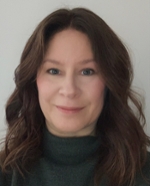 |
Thursday, July 4
Description: The goal of this presentation is to highlight best practice in educational partnerships between provincial schools and First Nations Education Authorities. Bert Fox Community High School is located in Fort Qu’Appelle, Saskatchewan where Treaty Four was signed nearly 150 years ago, and is part of Prairie Valley School Division. We work in partnership with both the File Hills Qu’Appelle Tribal Council, and with Independent Nations, such as Pasqua First Nation who take full responsibility for educations for all Pasqua First Nations members. We will tell a story of partnerships as we improved educational outcomes for Indigenous students and teach all students the outcomes of Treaty Education. We respect and honor the spirit and intent of Treaty through the work we do together on a daily basis.
|
Bio: Cory Cochrane is the Vice-Principal at Bert Fox Community High School. He lives in Fort Qu’Appelle with his wife and two children. One daughter graduated last year from Bert Fox and works at the daycare within the school, while the other daughter is just finishing Grade 11 at Bert Fox. He holds a B.P.A.S., a B.Ed., and an M.Ed. in Educational Administration, all from the University of Regina. Cory has been a classroom teacher, Career Guidance counsellor, FTV facilitator, Learning facilitator, and a student services teacher and administrator during his 24 years at Bert Fox. Cory has spent his entire life in the beautiful Qu’Appelle Valley and would be considered a “lifer,” as his parents, aunts and uncles, and cousins have all graduated from Bert Fox. He is proud to call the valley home and is continually excited about the staff’s commitment to establishing relationships with families and communities. Cory appreciates the dedication of the staff in reflecting and growing their understanding of pedagogy and assessment to meet the needs of FNMI students at Bert Fox. |
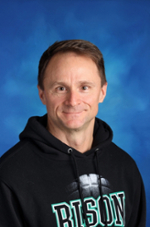 |
|
Bio: Alana Starr hails from the Starblanket and Muscowpetung First Nations and now lives in the scenic Qu’Appelle Valley with her husband, three children, and two beloved pets. Alana possesses extensive knowledge and expertise in Indigenous Education, holding a B.Ed. from the First Nations University of Canada and an M.Ed. from the University of Regina. Her professional experience spans various roles within First Nations Education, including Classroom Teacher and English Language Arts Consultant. Currently, Alana serves as the Supervisor of Student Achievement for the File Hills Qu’Appelle Tribal Council Education Department. |
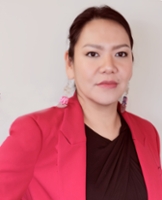 |
|
Bio: Julie Stiglitz is the Principal at Bert Fox Community High School. She lives in Fort Qu’Appelle with her husband and two children who attend Fort Qu’Appelle Elementary Community School. She has a B.Ed and a M.Ed in Educational Administration both from the University of Regina. Julie has been a classroom teacher, student services teacher and administrator at three schools, K-12, Pre K-8 and now at a high school. Julie grew up in a small community near Yorkton but feels at home in the valley. Julie is proud of the work her staff does in reconciliation and to improve educational outcomes for Indigenous learners. |
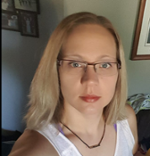 |
Description: The Sun West School Division prioritizes personalized learning and 21st Century skills for all students. Strong school leadership is essential to creating the environment, culture, and conditions necessary for programming to help staff and students reach these goals. In this session, Jade and Kim will share a variety of innovative programs that are occurring in Sun West School Division, and share some leadership strategies and considerations for current and future principals to assist in leading your schools through the 21st Century.
| Bio: Jade has spent over 30 years in education, serving in multiple leadership roles including School Based Administrator, Learning Consultant, Instructional Designer, and Learning Facilitator with the STF Professional Learning Cohort. Educational research is a passion and she led a division-wide action research project on Blended Learning and is currently involved in a McDowell project focused on reconciliation. She has a master’s degree in curriculum where she focused on using technology to engage learners. Currently, she is working towards a PhD at the University of Saskatchewan, investigating the role of rural school leaders in supporting reconciliation through anti-racist education. Jade enjoys the opportunity that leadership has provided to serve as a coach and mentor, working alongside collaborative learning partners. | 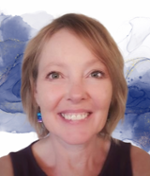 |
|
Bio: Kim Fick has been in school leadership for 18 years. She has been vice principal and principal in Pre-Kindergarten through Grade 12 schools that ranged in enrolment from 25 to 350 students over that time. Currently, Kim is a Superintendent of School Operations in Sun West School Division and her portfolios and areas of passion include School Community Councils, Indigenous Perspectives, and Parent Engagement. She considers herself very fortunate to work with the student-focused team at Sun West School Division, and thinks the principalship is one of the most rewarding jobs in education. |
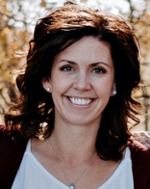 |
Friday, July 5
Description: "Empowering Educational Leadership: Harnessing Creativity and Technology for Student Success in the Age of AI," promises an insightful exploration of innovative resources and the transformative power of creativity in education. Inspired by work with Sir Ken Robinson, Marc is dedicated to integrating AI in educational contexts to empower both educators and students to embrace creativity. This session is tailored to aspiring leaders in education. We will journey through the convergence of creativity, technology, and leadership, advocating for the strategic integration of artificial intelligence to streamline administrative tasks and enhance teaching. From the origins of AI in education to groundbreaking innovations, participants will gain practical insights on leveraging technology to foster innovation and personalized learning. Join us to explore how AI can revolutionize educational leadership in the digital era.
| Bio: Dr. Marc Gobeil brings over a decade of experience as a sessional lecturer at the University of Saskatchewan's College of Education. Currently going into his second year as the principal of the Saskatoon Campus of the Saskatchewan Distance Learning Centre (SaskDLC), Marc's expertise spans both traditional and distance education. Previously, Marc served as a Coordinator of Learning Services at the Greater Saskatoon Catholic Schools board office for five years, overseeing diverse portfolios including assessment and reporting, practical and applied arts, and educational technology. Prior to his role at the board office, Marc spent a decade teaching in various high schools, during which he was awarded the Prime Minister's Award for Excellence in Education for an innovative Guitar building project at Oskayak High School. Dr. Gobeil’s commitment to education, coupled with his research in experiential learning and practical experience, establishes him as an advocate for educational leadership, creativity, and technology integration. |  |
The 2024 SPSC program focuses on six major categories. During the week we ask each fireside chat group to submit questions to be asked to a panel of our SPSC facilitators on the last day. We are asking that you explore these six “framing topics” at the culminating plenary called “READY SET, ASKED, AND ANSWERED”. Our expect panel of facilitators takes turns answering the selected questions that come out of those submitted by the separate “fireside chat” cohorts.
Framing Topics
- Planning and Accountability
- Change Leadership
- Leading Learning
- Social Responsibility and Inclusion
- All Our Relations: Partners in/and Education
Impact Session Descriptions
Description: The Office of the Registrar will be sharing three new changes impacting secondary schools in Saskatchewan including the new graduation programs being implemented in the 2024-205 school year, the move to MyCreds, a new, modern portal to access transcripts, and a change to how secondary level credits are assessed for credit transfer for newcomers.
Bios:
Deni Miclea (he/him)– Registrar and Director, Student and Educator Services Unit
Deni Miclea is a retired member of the Canadian Armed Forces and a former middle years and high school teacher. He taught in Prairie South School Division, First Nations Schools, Treaty Education Alliance and as a sessional instructor teaching Math Methodologies at the University of Saskatchewan and the First Nations University of Canada. In 2022, Deni joined the Ministry of Education helping to implement MySchoolSask (MSS) before transitioning into his current role as the Registrar.
Michelle Burant Epp (she/her)– Assistant Registrar, Student and Educator Services Unit
Michelle started her career as a classroom teacher in elementary and high school, transitioned to technology integration, and then worked as an instructional designer with the RCMP. In 2014, Michelle joined the Ministry of Education as the Assistant Registrar and enjoys helping students, teachers and administrators navigate ministry processes and policies.
Description: Sense making is a crucial leadership action carried out daily in schools and division offices. Effective practice allows for greatest leadership impact and alignment to strategic goals and outcomes. In this session, Gwyn and Paul will share their journey in sense making to grow the teachers in their school and their community as partnered school-based leaders. Participants will be challenged to apply their knowledges, skills, and dispositions to relevant case studies and participate in group leadership learning.
Bios: Gwyn Fournier and Paul Bazin are white settlers from Treaty 6 territory who have lived multiple leadership roles and responsibilities in a large urban school division in Saskatchewan.
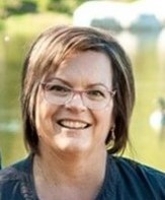 |
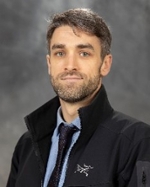 |
Description: As climate change increasingly impacts learning environments in Saskatchewan through wildfire smoke and heat waves, more and more youth are calling on schools to take leadership on climate and sustainability action. This session brings research-based insights about the role school leaders are playing in enabling action, resilience, and hope with and for young people and their communities. Participants will learn actionable examples of policies and practices drawn from research carried out by the University of Saskatchewan’s Sustainability and Education Policy Network (www.sepn.ca), and will participate in a visioning exercise to identify inspiring and creative ideas to increase sustainability and climate action in their schools.
|
Bio: Nicola Chopin has been the Project Manager for the Sustainability and Education Policy Network (SEPN) since the Network was established in 2012. She is also the Project Manager of the Monitoring and Evaluating Climate Communication and Education (MECCE) Project and has contributed to many UNESCO and SEPN reports. She was a lead planner for the 2019 Annual Conference of the Canadian Network for Communication and Environmental Education (EECOM), the first national conference in Canada to focus on climate change education. She holds a Masters in Applied Social Psychology, and her work has focused on community-university partnerships, intergovernmental engagement, evaluation, and monitoring. Nicola has coordinated multi-methods research in a wide variety of social science areas including climate change education, sustainability education, health science education, quality of life, poverty, and homelessness. In addition to managing SEPN’s research and administration, Nicola contributes extensively to SEPN’s communications, including research briefs, infographics, and reports. |
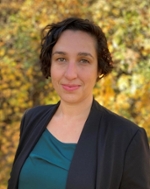 |
Description: Given the imperative that exists to improve Indigenous academic outcomes, School-Based Administrators have an important role in shaping, affirming, and growing this work in their schools. This session will explore various elements of utilizing Indigenous student data such as data literacy and practical approaches of how to move from reviewing the data to creating actions to support Indigenous learners in school. This session will draw on the practical experience of an Indigenous Secondary Principal to show how thoughtful use of Indigenous data can influence the development of welcoming learning environments for Indigenous learners. The intent of this session will be to provide School-Based Administrators with useful and practical strategies they can use address supporting Indigenous academic outcomes in school.
|
Bio: Marnie Ross is a proud member of the Red Earth Cree Nation. As an ITEP Graduate, she has been honored to serve many communities over the last eighteen years. She began her career on the Thunderchild First Nation as a Secondary English and Indigenous Studies teacher. For the last fifteen years she has proudly served Sasaktoon Public Schools in many exciting roles as a teacher, Educational Consultant for the First Nations, Inuit and Métis Unit, Seconded Teacher to the Indian Teacher Education Program working in Field Experiences, Vice Principal of Aden Bowman Collegiate and most recently spent the last four years as the Principal at Aden Bowman Collegiate. In the fall, she is excited to be moving into a new role as the Coordinator of Learning Supports for Grades 9 – 12. Marnie has two daughters who have recently finished their undergraduate degrees with their mom excited to see what adventures come next for them. Marnie has served on many committees and been passionate about the power of professional learning. Over her career, she has been active in creating spaces of community for Indigenous Educators and Leaders, particularly in public education. She is passionate about creating inclusive and welcoming environments in schools while continuously working toward equity in education. |
|
Description: In this article, the relationships between the nature of the professional leadership culture and student learning are examined according to the professionals’ perceptions. The qualitative case study examined the perceptions of school-level professionals in one elementary school with a reputation for strong results in student learning, regarding the nature of the professional leadership culture and its relationship to student learning. Professional leadership culture is defined by this author as shared assumptions, practices, beliefs and values concerning leadership activities that are understood and practised among school professionals. Schein’s (2010) organizational culture and leadership model provided the conceptual framework for the study. The three most common representations of the professional leadership culture included pervasive collaboration among professionals, a culture of trust, and a supportive environment. This study prompts some reflection for theory-building on the connection between the concept of leadership and its role in improving school culture. Policy implications of the study are discussed as they relate to human resources issues and their connection to culture and leadership, priorities regarding personnel supervision and evaluation, standards for a respectful workplace, the institutionalization of trust, open communication, supportive relationships, collaboration, and the anticipation and management of workplace conflict.
| Bio: Dr. Robert (Rob) Liggett (Ph.D.) is a sessional lecturer with research into leadership, school culture, and building effective schools. He has worked in rural and urban school systems and is a regular presenter at scholarly conferences in educational leadership. Robert is a bilingual educator with over 25 years of relevant experience who continues to consult and contribute to improving achievement in organization’s goals and objectives. His research interests are in the areas of organizational theory, educational leadership, and instructional improvement. | 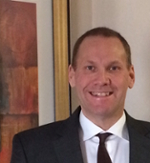 |
Description: The Office of the Registrar will be sharing three new changes impacting secondary schools in Saskatchewan including the new graduation programs being implemented in the 2024-205 school year, the move to MyCreds, a new, modern portal to access transcripts, and a change to how secondary level credits are assessed for credit transfer for newcomers.
Bios:
Deni Miclea (he/him)– Registrar and Director, Student and Educator Services Unit
Deni Miclea is a retired member of the Canadian Armed Forces and a former middle years and high school teacher. He taught in Prairie South School Division, First Nations Schools, Treaty Education Alliance and as a sessional instructor teaching Math Methodologies at the University of Saskatchewan and the First Nations University of Canada. In 2022, Deni joined the Ministry of Education helping to implement MySchoolSask (MSS) before transitioning into his current role as the Registrar.
Michelle Burant Epp (she/her)– Assistant Registrar, Student and Educator Services Unit
Michelle started her career as a classroom teacher in elementary and high school, transitioned to technology integration, and then worked as an instructional designer with the RCMP. In 2014, Michelle joined the Ministry of Education as the Assistant Registrar and enjoys helping students, teachers and administrators navigate ministry processes and policies.
Description: This introductory session, "Cultivating Allyship: Supporting Queer Students and Staff in Schools," is designed to equip new school leaders with knowledge and skills to help foster an inclusive and supportive environment for 2SLGBTQ+ students and staff. Participants will be introduced to key queer terminology and concepts, enhancing their understanding and sensitivity towards the diverse identities within the 2SLGBTQ+ community.
The session will delve into current statistics concerning students in Canadian schools, highlighting the unique challenges they face and underscoring the importance of proactive allyship. By examining the concept of privilege, participants will gain insights into the systemic barriers that queer individuals encounter and learn how to use their own privilege to advocate for and support their 2SLGBTQ+ colleagues and students.
A significant focus will be placed on the importance of pronouns and their role in affirming identities and fostering a sense of belonging. Practical strategies will be provided on how to be an effective ally, including creating inclusive policies, promoting visibility, and supporting mental health and well-being.
| Bio: Katryne is a Ph.D. student with the Department of Curriculum Studies at the College of Education, University of Saskatchewan, studying Queering Saskatchewan's High School Mathematics Curricula. She has worked with SPSD as a K-12 mathematics and science teacher for the last two years and occasionally as a sessional lecturer with the Department of Curriculum Studies. Previously, she worked at École Gravelbourg School with Prairie South School District #210 for eight years, where she started, supported, and led the most southern Gay-Straight Alliance in Saskatchewan. Katryne has lived in three provinces and six cities so far, and she currently lives in Saskatoon with her husband and their two dogs and four cats. She continuously strives to support 2SLGBTQ+ communities in her schools and personal life. | 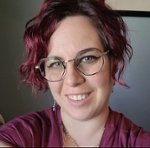 |
Description: This session will connect the impact effective administrator walk throughs can have on student learning in the classroom. In this session we will discuss how administrators can support teachers and students in the classroom through formative feedback and reflection. The intent of this session is to provide strategies to support administrators as they help drive continuous improvements in classrooms.
|
Eric Campbell began his education career as a middle years’ teacher in 2009 and has been a school administrator at the Prairie South School Division for the past seven years. A strong advocate for student engagement as essential components of learning, Eric currently works to foster an engaging educational environment at Lindale Elementary School in Moose Jaw. His passion for community involvement has helped create many exciting opportunities for students and families around Moose Jaw. Outside of work, Eric enjoys spending time with family, playing golf, coaching hockey, and baseball, and embracing the "lake life" with his wife and two kids. |
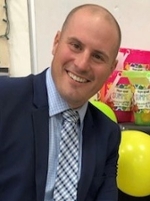 |
Description: The Historical Overview of SUNTEP and the Impact the TEP program has made in K-12 education as well as on our Métis Community.
| Bio: Sheila Pocha is currently the Program Head of the Saskatchewan Urban Native Teacher Education Program (SUNTEP) at the University of Saskatchewan (U of S). She is also a proud graduate of SUNTEP. She has taught in northern and urban settings and as a sessional lecturer for the College of Education at the U of S. Her experience as a teacher, administrator and community volunteer help her to be an advocate for Anti-Racist and Anti-Oppressive education. Sheila has served on a number of committees and Boards, including the Awasis Special Subject Council with the Saskatchewan Teachers’ Federation, the Ministry of Education, and Saskatoon Public Schools. Sheila has had the honour and privilege of serving as a volunteer on the boards of the Saskatoon Pre-School Foundation, the Gabriel Dumont Institute, Station 20 West, Quint Development, the Batoche Shared Management Board, SaskCulture and the University of Saskatchewan Senate. Her work and experiences have helped her interact with a diverse range of individuals and groups in her quest to give those she serves hope, strength, and courage. | 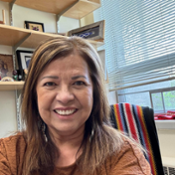 |
|
Bio: Stacey Alexandre is currently the Provincial Coordinator of the Mental Health Capacity Building initiative which is connected to school divisions across Saskatchewan. Since 2007, Stacey has worked within the Saskatchewan Health Authority supporting a variety of mental health initiatives at the school and division levels. He specializes in the core competencies around self-regulation and co-regulation and is looking forward to bringing these skills and knowledge to you. |
 |
|
Bio: Rob Lehne (he/him/his)Rob taught in Davidson and Melfort Saskatchewan, in high school settings, primarily as a Core French teacher. This always came with “other duties as assigned”, so he has taught a plethora of subjects and grade levels. Rob taught in the classroom for 15 years, with some opportunities in a coordinator role. Rob was connected to the STF and local associations from year one, serving in almost every local association capacity, and numerous STF roles. He started with the STF as a Senior Administrative Staff member in 2010. His current field assignment includes Ile a la Crosse, Creighton, Northern Lights and Saskatoon Public school divisions. Rob’s portfolio includes local associations, Pension and Benefits board, Teachers’ Superannuation Commission, and provincial bargaining. |
|
Bio: Tansi, my name is Jackie Durocher, an Indigenous Educator, leader and advocate for Northern Saskatchewan. I am a proud member of Lac La Ronge Band and Buffalo Narrows is my home community. My two children and 4 Grandchildren are what drive my passions in creating a better Saskatchewan for them and future generations. For the past 32 years, I have navigated the education system in Northern Lights School Division #113. Serving in diverse capacities ranging from elementary teacher, Principal, and currently serving as the Superintendent of Education. I have served over 14 communities in Northern Saskatchewan in the past 7 years. My passion for education is rooted in Mental Health Education and the Decolonization of Education. |
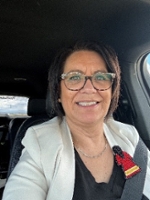 |
Description: Dr. Sawchuk will lead participants through a series of perspectives on parent and family engagement. Participants will develop skills in developing their own framework to work with community to support learning outcomes for students. Family, school, and leadership components of family engagement will be explored based on both research and practice. The four articles that this presentation is based upon are attached for participants' consideration.
| Bio: I am a researcher interested in anything to do with education, building community, and the social determinants of health. I am a social justice theorist and a mixed methodologist. I completed my master’s with a thesis in Curriculum Studies at the U of S and recently completed a Ph D in Health Sciences from the College of Medicine. For the last 34 years I have worked in the context of elementary schools while going back to university. I have been a school-based administrator for the last 22 years. My husband Barry and I have five daughters in a blended family, a grandson, and I can’t forget our dog, Daisy! |
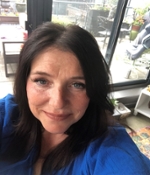 |
Description: With the growing diversity and complexity in our schools and classrooms, it has become imperative for adults in schools to shift thinking to encompass trauma-invested approaches to create positive learning environments for all. This session will highlight the importance of having school wide expectations and research-based practices to support positive learning behaviours within environment, instruction, curriculum and assessment.
|
Bio: I have worked for Greater Saskatoon Catholic Schools (GSCS) for over twenty years, with experience as a classroom teacher, learning assistance teacher, and over 10 years experience in administration. I currently work as a Coordinator of Student and Learning Services, with the majority of my work focused on working with school teams, students, and families to support complex behavioural needs. I have always believed that students will do well if they can and adults have a significant role in supporting the development of children to grow academically, emotionally, and spiritually. I am passionate about supporting adults to understand that behaviour is a form of communication, allowing them to identify its function and create inclusive classrooms where all students can thrive. |
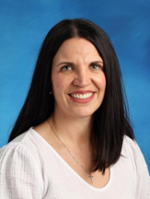 |
Bios: Laurie Anderson and Liz Harrison are strategic facilitators with Prairie Spirit School Division. Laurie has taught EAL overseas and in Canada for over 20 years. Liz Harrison was an elementary classroom teacher for many years and has been a coach for the last 12 years.
Description: The session will overview the role of a school principal when managing fundraising revenues and school-based funds. We will also discuss the types of fundraisers that are acceptable and how to manage public perceptions when requesting funds.
| Bio: Joel Lloyd joined Greater Saskatoon Catholic Schools in 2013 in the position of Chief Financial Officer and Information Technology. In his role, he has executive responsibility for the school division’s finances, facilities, transportation, payroll, insurance, and legal matters. Joel has always promoted transparency in school finances and the prioritization of funding to support classrooms whenever possible. Prior to joining Greater Saskatoon Catholic Schools, he worked for Living Sky School Division and Light of Christ School Division which are both located in North Battleford, Saskatchewan. Joel resides in Saskatoon, with his wife Ashley and two children, Maya and Hudson. When not working, Joel can be found at his family cabin, the rink, or the ballpark. |  |
Description: This session will focus on graduate programs in educational administration (leadership) in the Department of Educational Administration at the University of Saskatchewan. Dr. Newton will speak about the value of graduate education in the career development of school leaders, outline the different graduate programs of the department, and answer questions participants might have about graduate degrees, admission, and graduate-level acadmic expectations. This session will present information about the Master’s programs (course-based and thesis), the Indigenous Educational Leadership Cohort (IELC), the Doctor of Education (EdD), and Phd Program in the department.
|
Bio: Dr. Paul Newton is Professor and Department Head in the Department of Educational Administration at the University of Saskatchewan. Formerly, he was an Associate Professor in the Department of Educational Policy Studies at the University of Alberta and a rural school principal in Saskatchewan, Canada. He serves as editor in Chief of the Canadian Journal of Educational Administration and Policy and is Past President of the Canadian Association for the Study of Educational Administration. His research interests include administrative practices, the principalship, sustainability and social justice in schools, educational improvement, teacher leadership, and theoretical constructions of leadership and administration. |
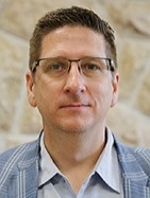 |
Description: Learn about how a request from Boards of Education for a resource to support at all levels, strategic improvement planning in Indigenous education resulted in the creation of the Indigenous Education Responsibility Framework. This session also provides an overview of Indigenous education in the provincial education system. Topics and linkages covered include: the Government of Saskatchewan’s Inspiring Success Policy Framework, the Provincial Education Plan Inspiring Success Priority Action and how the Indigenous Education Responsibility Framework builds on past work, supports future actions, and helps align all levels of the provincial education sector in Indigenous education.
Bio: Felice McKay, Strategic Advisor for Indigenous Education for the Saskatchewan School Boards Association. With almost two decades of experience in public administration and Indigenous education policy, her current work focuses on providing Indigenous Education Services in support of the SSBA strategic plan and the Indigenous Constituency. She has a bachelor’s degree in Indigenous Studies, a Master Certificate in Public Management, and a Master of Public Administration. She is a mother to two boys, a member of the George Gordon First Nation and lives/works on Treaty 4 territory.
Description: Building on the concept of a learning culture and its importance in empowering teachers and improving school environments, this session is designed to help principals develop skills and knowledge needed to mindfully cultivate a learning culture within their schools.
Key Areas of Focus:
Understanding Mindful Leadership
Explore the concept of mindful leadership and its significance in effective decision-making and creating positive school culture.
Creating a Sense of Belonging
Learn techniques for fostering a collaborative environment where everyone feels heard and appreciated.
Building Leadership Capacity
Engage teachers in authentic conversations about teaching and learning.
Emphasize that the impact of educators lies in their ability to learn and stay curious
Discuss how teacher agency enhances engagement, fosters professional growth, and promotes student success.
Action Planning
Develop a simple action plan outlining one strategy to enhance teacher agency
Consider potential challenges and how to address them.
This session is designed to help principals foster a learning culture through mindful leadership, ultimately leading to more empowered teachers and improved school environments.
| Bio: Susan Plant began her career in education in Meadow Lake in 1997. She has over 15 years of instructional leadership experiences as a school administrator, math catalyst teacher and learning coach. She holds an M.Ed. in Curriculum and Instruction and has conducted research on effectively supporting the professional development and growth of teachers through a research grant from the McDowell Foundation. Currently serving as Superintendent of Learning for the North East School Division, she works with an amazing team of leaders to support learning and assessment. She balances her work life completing home improvement projects with her husband, golfing with her family and enjoying her new grandson! |  |
Description: Eventually all leaders need to provide feedback to colleagues, peers, and individuals. Yet, providing feedback is not a natural skill set for many people and can be become a point of stress and anxiousness as much for those who receive it as it is for those who provide it. Good feedback is a necessary and important step in workplace leadership and can be a source of improved outcomes, strengthened relationships and healthy workplace cultures. This session will explore some models for providing feedback and identify some good resources for learning more about conversations that matter.
| Bio: I get to be a Learning Superintendent with Prairie Spirit School Division. In addition to supporting principals and vice principals across our school division through the Admin Planning Team and our Administrative Leadership Team, it is my great privilege to hold the portfolio for Indigenous Perspectives, Partnerships and Outcomes. I have worked in education in three provinces, numerous schools and grade levels, and have 10 years of experience as a school principal. I am very excited to be learning alongside so many great people at this year’s SPSC. | 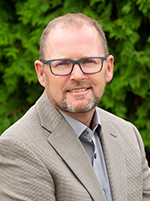 |
Description: Participants will explore the impact of microaggressions on workplace culture, team cohesion and productivity. Through practical scenarios and interactive exercises, participants will learn what microaggressions are, how they manifest, and how to recognize and respond to microaggressions to assist them in creating a workplace culture that fosters respect, understanding, growth and belonging. Participants will learn strategies that can be used to build capacity amongst their staff in addressing and recognizing microaggressions and will have the opportunity to ask questions and share experiences. This session will help one discover the power of leading with courage to effectively build a stronger and more inclusive workplace.
Description: Innovation in Education is hard, but school leaders can sow the seeds for it by engaging their staff in certain ways. This session will briefly outline some strategies that have worked in my practice both as a school principal myself, and as an engaged staff member working with an enlightened and supportive administrative partner.
|
Bio: David Crowell has been an educator in and around Saskatoon for nearly three decades. A University of Saskatchewan Alum himself, he has combined his background in Educational Administration with a life-long passion for Science, Technology, Engineering and Mathematics (STEM) material in ways that have inspired hundreds of staff and thousands of students. David’s work has been recognized with multiple awards including the J.C. Bates Award, a Governor General’s Medal, and most recently the Prime Minister’s Award for Teaching Excellence. David currently works as the Vice Principal of Montgomery Elementary School in the Saskatoon Public School Division and is the coordinator of the interSTELLAR loaner program which sends low cost, highly engaging STEM materials to every elementary school in the system. David is a long-time resident of Saskatoon where he, and his wife Janice, raised two amazing children, Bretton and Olivia. |
| Bio: I have the privilege of being a Superintendent of Schools with Saskatchewan Rivers Public School Division. In this role I get to support our school-based leadership teams here in our division as well as develop community engagement and communications at the division level. I have spent most of my career in education in Alberta having taught and been a school-based administrator in two divisions there. I have a passion for creating compassionate learning communities in the spaces I serve and completed my Doctoral research in this topic using Integral Theory. I moved to Prince Albert in 2022 to join the incredible work being done in Sask Rivers and to be able to live and play in both the prairies and the forest. | 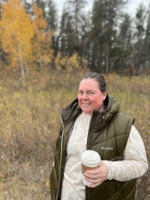 |
Description: Building off their 2022 McDowell research project “Female Leaders and their Impact on School Culture in Saskatchewan,” Amy and Amy will facilitate activities designed to empower participants to dismantle informal networks that create power imbalances, create formal and informal mentorship opportunities and challenge traditional norms and expectations. All genders welcome!
|
Bio: Amy Korver is Vice Principal at Delisle Elementary School, a member of the Saskatchewan Teacher's Federation's Provincial Executive, and mom to her one year old son, Jasper. She is passionate about literacy, women in leadership, and publicly funded public education. When she's not leading, teaching, or advocating she can be found reading, hiking, or travelling.
|
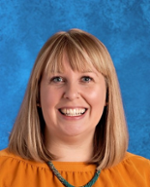 |
| Bio: Amy Orth has been an educator for 20 years, working in a number of rural communities. She is currently the principal at Aberdeen Composite School and was recently elected as a member of the STF provincial executive. Amy is passionate about adult learning, public education and leadership. In her spare time, she can be found making snacks for the small people that live with her. | 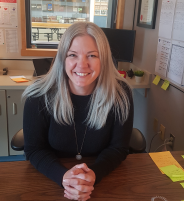 |

